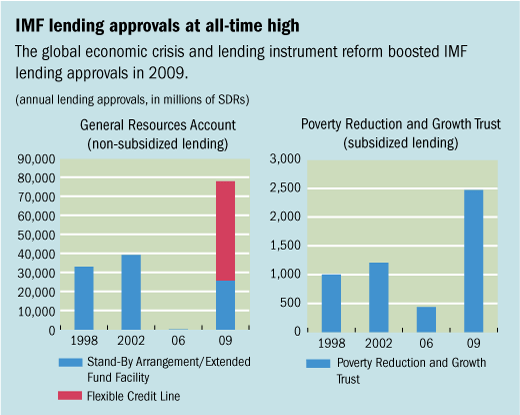
Typical street scene in Santa Ana, El Salvador. (Photo: iStock)
IMF Survey: IMF Pushes Reforms to Its Governance and Mandate
June 8, 2010
- Push to complete IMF governance reform by January 2011
- Further lending reforms under consideration
- Greater focus on spillover effects and financial sector issues
As the world economy struggles to overcome concerns about mounting public debt in many advanced economies and the lingering effects of the crisis, the IMF is pressing ahead with further reforms to make sure it continues to respond effectively to the needs of its 186 member countries.

Aluminum in Barcarena, Brazil: IMF to assist G-20 countries with analysis on how policy frameworks, economic projections fit together (photo: Werner Rudhart/DPA)
IMF STRATEGY
High on the list of priorities is reform of the governance of the institution, where a deadline of January 2011 looms large. Further changes to the Fund’s lending toolkit are also on the agenda, as is improving the effectiveness of its policy analysis and advice.
In this interview, Reza Moghadam, Director of the IMF’s Strategy, Policy, and Review Department, discusses the strategic shifts under way in the way the IMF works and engages with its member countries.
IMF Survey online: What are the IMF’s key priorities as the world economy goes through another bout of instability?
Moghadam: Despite early signs of recovery, we still cannot say the crisis is safely behind us, and significant challenges remain. In recent months, sovereign risks have become more elevated, and related concerns persist over the health of countries’ financial sectors. Other issues could also threaten recovery, including a lack of consensus at the global level on how to improve regulation of the financial sector, entrenched unemployment, and excessively volatile capital flows.
The IMF’s work program—which is the biannual statement of our top priorities—is designed to help our member countries address these challenges.
The IMF will continue to identify and respond to economic developments at the global level through our flagship analysis reports, the World Economic Outlook and Global Financial Stability Report. We will also continue to focus on developments at the country level through our surveillance and lending activities, and bridge multilateral and bilateral perspectives through the introduction of spillover reports. And we will continue to play our part in fostering strong, sustainable, and balanced growth by assisting the G-20 countries with analysis on how their policy frameworks and economic projections fit together.
IMF Survey online: What is being done to ensure that the IMF has the right tools and enough money to lend to countries that may need assistance?
Moghadam: Much has already been achieved. You may recall how we overhauled all of our lending frameworks in 2008–09, adding new precautionary financing options to our toolkit. We also received a substantial boost to Fund resources from supplementary borrowing. Along with these changes, the Fund’s peak 12-month flow of new commitments has reached a new record, exceeding any past 12-month lending commitments (see chart). We see this as an indication that we are meeting the needs of our member countries, but further reform is needed and is on the way.

At the October 2009 Annual Meetings in Istanbul, the IMF’s policy steering committee, the International Monetary and Financial Committee (IMFC), called on the Fund to “review its mandate to cover the full range of macroeconomic and financial sector policies that bear on global stability.” In response, we are actively evaluating the Fund’s role in surveillance, financing, and in ensuring the stability of the international monetary system.
While the mandate review is not yet complete, we already know that the Fund’s effectiveness depends in large part on the quality and influence of its surveillance. Our annual consultation with member countries (known as the Article IV process) is appreciated and valued by our member countries, but we need to strengthen it further so that we enhance its impact. We can improve by sharpening our focus on systemic risks and spillovers, including those related to macrofinancial issues.
"This crisis underscored the interconnectedness of the global economy, and fostered a greater appreciation that the largest and most dynamic economies must be better represented if multilateral efforts at enhancing growth and stability are to be effective."
On lending, our aim is to strengthen crisis prevention and preserve confidence in the system. We are looking at ways to further strengthen our toolkit, and the work program takes this forward by considering improvements to the Flexible Credit Line, a possible new precautionary credit line to serve a broader group of member countries, a new multicountry mechanism to stem contagion from systemic events, and collaboration with regional financing arrangements.
The expansion of the IMF’s borrowing arrangements played a major role in stabilizing the global economy at the peak of the crisis. At the same time, the IMFC has emphasized that the IMF is and should remain a quota-based institution, with a permanent resource base. Determining the appropriate size of the Fund will of course provide critical input into discussions on the 14th General Review of Quotas scheduled for this year.
IMF Survey online: What lessons have been learned from the lending programs that were put in place to help countries pull through the crisis?
Moghadam: The favorable response to IMF-supported programs has demonstrated the value of actual and contingent financing, and of designing instruments tailored to the strength of countries’ policies. Focusing on country needs and taking into account their individual circumstances has facilitated the policy responses and financing needed to cushion the blow from the worst global crisis since the 1930s. IMF-supported programs have generally helped countries avoid worse outcomes: the adjustment in external balances has mostly been less extreme than in past crises, and fiscal policy has in most cases been able to accommodate the needs of the crisis and adjust to evolving conditions.
Initial program conditionality has been more focused than in the past, and compliance has so far been better. But there are major challenges ahead, particularly in reducing public debt and in implementing difficult but ultimately growth-enhancing structural reforms. We need to keep our crisis programs under continuous review. And this is built into the work program.
IMF Survey online: Has meaningful progress been made in reforming the way the IMF is governed?
Moghadam: The crisis underscored the interconnectedness of the global economy, and fostered a greater appreciation that the largest and most dynamic economies must be better represented if multilateral efforts at enhancing growth and stability are to be effective. We see this in the increased weight of the G-20 in international economic cooperation and in the strengthened voice of emerging market countries in multilateral fora.
Emerging economies are, rightly, very proactive and take a strong interest in decision-making at the IMF. However, this de facto “stronger voice” needs to be translated formally into quota and governance reforms of the Fund.
At the 2010 Spring Meetings, the IMFC called for an acceleration of the substantial work still needed on the full range of quota and other governance reforms, including management selection, ministerial engagement, the composition and size of the IMF’s Executive Board, voting majorities, and staff diversity. We will continue to work closely with the membership to advance these efforts, with the pace of work likely to accelerate in the second half of the year.
IMF Survey online: What steps are being taken to ensure that the IMF’s policy analysis and advice is being listened to and acted upon?
Moghadam: Better traction of the IMF’s advice across the membership is a key goal of the Fund’s mandate review. For starters, and related to your previous question, if we are to be credible in the advice we give to our members, meaningful quota and governance reform must be achieved.
"Stronger global financial regulation and, importantly, supervision are key to avoiding a repeat of the crisis."
But beyond these vital quota and governance issues, there are other reforms that can be pursued to strengthen the impact of the IMF’s advice. One such reform that I mentioned earlier is a greater focus on multilateral surveillance, including spillovers, recognizing the world is an increasingly interconnected place.
We will also seek to clarify the legal framework for members’ obligations under Article IV, and will try to find ways to better reflect the findings of our financial sector analysis by integrating our stability assessments under the Financial Sector Assessment Program (FSAP) into Article IV surveillance for countries whose financial systems are of systemic importance. A Multilateral Surveillance Decision to clarify the IMF’s role in preserving systemic stability through our surveillance activities may also improve the traction of IMF surveillance.
IMF Survey online: How worried are you about the current lack of international coordination when it comes to financial sector regulation? What role does the IMF see for itself in helping shape financial regulation and ensuring better oversight?
Moghadam: Stronger global financial regulation and, importantly, supervision are key to avoiding a repeat of the crisis. A number of countries are advancing their own domestic reform plans and these need to be coordinated internationally in order to avoid unintended consequences. Our Monetary and Capital Markets Department is actively involved in these issues, working with others in the Fund, our member countries, and with other relevant organizations.
As I mentioned, a key aspect of the IMF’s ability to be an effective guardian of global macroeconomic and financial stability includes overseeing the implementation of rules that govern financial regulation. One of the tools at our disposal is the FSAP, which examines and identifies the strengths and vulnerabilities of a country’s financial system.
With its near-universal membership, close and regular engagement with country authorities, and technical expertise on financial sector issues, the IMF is well positioned to lead on financial sector issues, working closely with the Financial Stability Board and others. We should take full advantage of our strengths to promote a sound outcome to regulatory reform on a global scale.
IMF Survey online: What do you expect will be the main themes for the IMF-World Bank Annual Meetings in October?
Moghadam: During the Spring Meetings, the IMFC made clear that it wanted to see progress on quota and voice reforms as well as deliver on the review of the IMF’s mandate with specific recommendations. I expect that by October we will have facilitated as much as possible an agreement on quota reform consistent with the IMFC’s commitments in Istanbul last year. I also expect that we will have a number of concrete proposals to improve our surveillance activities and to further strengthen our lending toolkit to ensure that we really can provide an effective global financial safety net.


